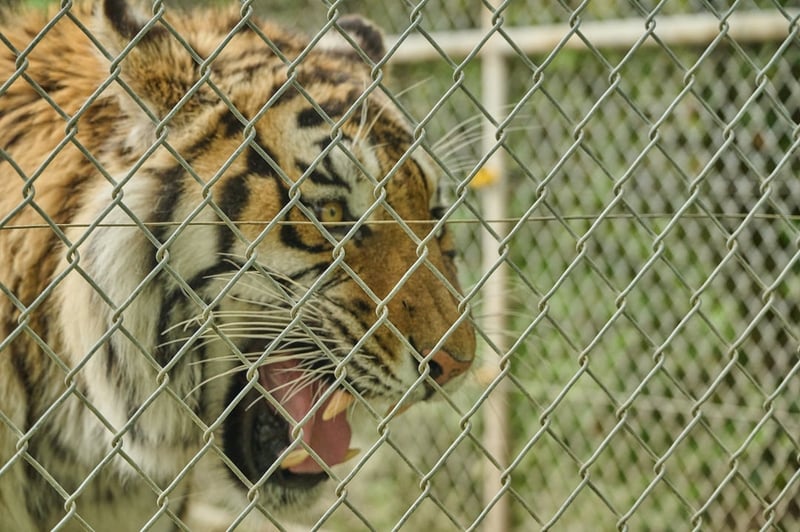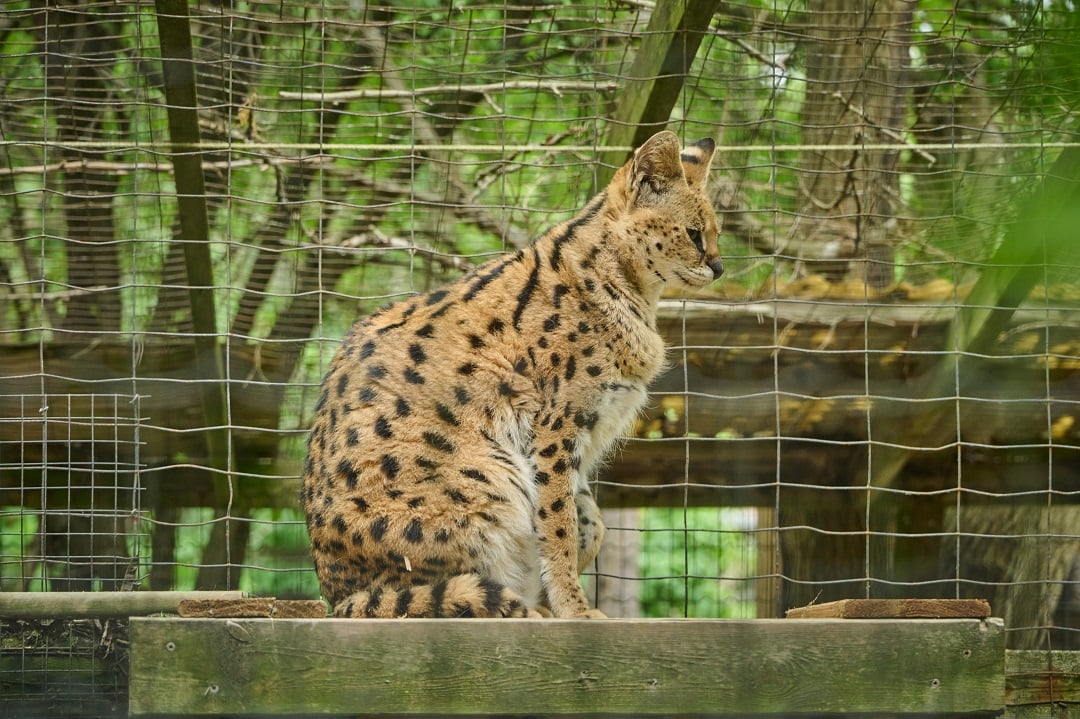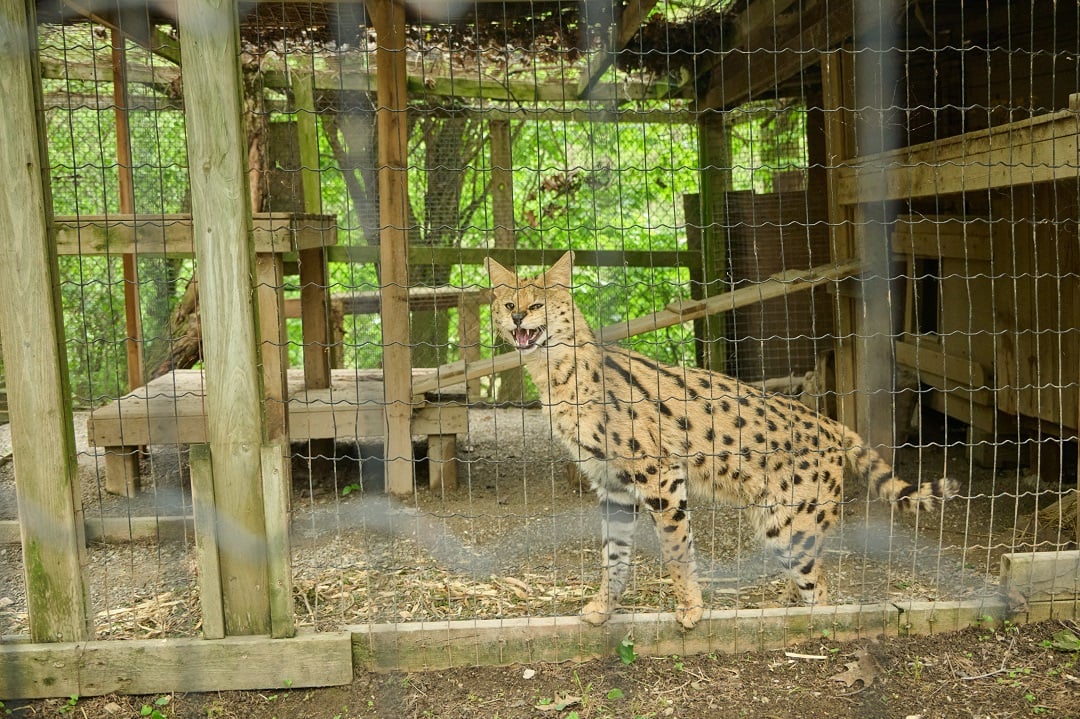
In 2007, I remember reading the headline “Woman mauled to death by tiger in B.C. Interior”. It’s a moment that followed me forever.
It’s not the kind of news you ever expect to see in Canada, let alone so close to home. I lived less than a 2-hour drive from where the fatal incident happened.
The “pet” tiger was kept in a small chain-link enclosure. From inside the cage, the tiger swatted at the woman, catching her leg and severing an artery. Her two children witnessed the attack and called an ambulance and the police. Sadly, the woman bled to death as a result of the severe injury.
It’s a tragedy that should never have been allowed to happen.
Following high-profile human injuries and deaths like this one, B.C. introduced regulations for keeping non-native (“exotic”) wildlife in 2009. The regulations were focused primarily on public safety, listing species that posed the most serious risks to human health or safety. It’s now illegal to own – for example – a lion or tiger in B.C. without a permit. And permits are usually only granted to facilities like accredited zoos.
Other wild cats slipping through the cracks
These 2009 regulations were some of the most restrictive in Canada at the time. Unfortunately, other animals like servals and caracals – wild cats native to Africa – slipped through the cracks.
Even in my earliest days working in wild animal welfare, I saw the suffering that captive wild cats endured and was working to close this regulatory gap. In the absence of regulation, ownership of these cats has grown rampant in B.C., where more than 70% of the servals kept as pets in Canada are found.
 A captive serval. (Photo: Sasha Rink / World Animal Protection)
A captive serval. (Photo: Sasha Rink / World Animal Protection)
Even when bred in captivity, these cats all have the same needs as their counterparts in the wild. In captivity:
- They experience frustration, unable to use their hunting skills or roam large territories.
- They can act unpredictably if they feel frustrated, stressed or threatened – posing a risk to their guardians, or other people and animals if they escape.
- They frequently escape due to their incredible climbing and jumping abilities.
- They can lack a proper diet that can lead to painful and debilitating metabolic bone disease.
A major cruelty investigation of a B.C. serval breeder in 2019 highlighted just how bad the problem is. The servals – including adults and kittens – were found living in horrific conditions in trailers. Bred for profit, but the animals pay the cost. Those images still live rent-free in my head.
Change on the horizon
Right now, the B.C. government is considering new regulations that would ban the breeding, sale and future ownership of exotic wild cats like servals, which are currently being kept in captivity across the province. Wild cats are not pets – and it’s time British Columbia’s laws reflected that.
We are urging the B.C. government to adopt the proposed regulation banning all non-native, non-domestic cat species from private ownership. Current owners would be required to apply for a permit, and would not be able to breed, sell or acquire new animals – making them the last generation of cats to suffer.
Live in B.C.? Send your letter of support today to stand up for these animals.
What about Ontario?
The conditions leading to the fatal tiger incident in B.C. mirrored the same conditions I saw at Ontario’s worst roadside zoos. The B.C. tiger was one of several that were privately owned by a couple in a small community, who invited the public to visit and have pictures taken with the tigers.
The tigers were kept in an under-sized, substandard chain-link enclosure, just like the ones I saw at roadside zoos in Ontario this year.
Today, Ontario remains the weakest jurisdiction in Canada for captive wildlife regulations. It shouldn’t take a tragedy like we saw in B.C. before Ontario acts.
 A captive serval. (Photo: Sasha Rink / World Animal Protection)
A captive serval. (Photo: Sasha Rink / World Animal Protection)
On May 29, I joined our Executive Director and colleagues from the Toronto Zoo, as MPPs Lucille Collard (Ottawa—Vanier) and Karen McCrimmon (Kanata—Carleton) announced the reintroduction of the Captive Wildlife Protection Act, 2025.
The proposed Bill would:
📝 Introduce mandatory licensing
🕵️ Require annual inspections and enforce stringent animal welfare and public safety standards
⛔ Put an end to the use of wild animals for entertainment
📖 Require trained, experienced staff and proof of financial stability
🔥 Ensure that all zoos have emergency preparedness plans
If passed, this Bill would finally bring Ontario in line with regulations in other provinces for the treatment of captive animals.
📢 If you live in Ontario, write a letter or email to your MPP to let them know you support this bill! (Find your MPP and their contact info here)
🐾 And take the pledge to never visit a roadside zoo!